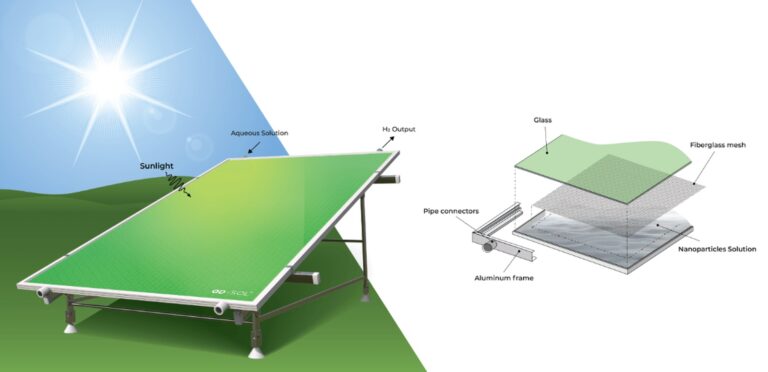Israeli company QD-SOL has quite a few things going for it. Not only is it working to produce completely green hydrogen – the renewable energy’s sector game-changing card and biggest buzzword – but it is also backed by none other than Hollywood star and sustainability entrepreneur Ashton Kutcher.
“Almost the entire hydrogen production industry is a polluting industry. After it’s produced, hydrogen is an excellent, green energy provider, but it’s usually made by burning gasses that also release a lot of carbon dioxide together with the desired hydrogen,” QD-SOL CEO Gil Davidman tells ISRAEL21c.
“The world’s already decided to take steps toward net zero emissions by 2050, so to reach that, among other things, you have to turn the production of hydrogen green.
At the moment, one way to produce green hydrogen in a non-polluting way is by electrolysis — directing electricity generated by solar or wind power to a system that isolates hydrogen from water.
This method, says Davidman, “can cost around five times more than the polluting ways of producing hydrogen, and yet there are many companies who are investing in the process.”
QD-SOL has taken a different approach. “As far as I know, we’re the first and only ones to break through the boundaries of academia,” Davidman says.
The company’s solution puts the whole process inside a solar panel, generating hydrogen directly from sunlight using nanoparticles that catalyze the separation of hydrogen from oxygen in water molecules. This is accomplished without emitting carbon dioxide.
“Our advantage is that we don’t need an energy source,” Davidman notes. “When you do electrolysis, you need to be connected to electricity infrastructure, even if it’s green. You can’t go to the middle of an empty desert like we can and set up a [solar] panel field. No less important is that we’re actually quite cheap because we don’t need that type of infrastructure.”
Moving quickly
The technology behind QD-SOL is based on years of research by Prof. Lilac Amirav from the Technion – Israel Institute of Technology, who’s now the chief scientific officer and one of the cofounders of the company.
“Even before we met and joined forces, Lilac got many grants, including from the European Union, for her research into photocatalysis,” says Davidman.
“Her research was the most effective and most substantive in terms of feasibility out of all the other studies we looked at,” Davidman says, referring to the group of entrepreneurs and investors – Kutcher included – who established the company. “The combination of money and groundbreaking research is a good one.”

QD-SOL received its license from the Technion a little over a year ago. “Around three months ago, we managed to produce hydrogen in our first 1-square-meter panel on top of the roof of our lab in the Ness Ziona Science Park. This is an amazing accomplishment,” he says.
“In the next year and a half, our aim is to create a first working system comprised of a few interconnected panels and to reach regular, automatic hydrogen production. When we reach that target, we’ll be able to partner up with big actors in the hydrogen entrepreneurship industry to set up our project’s first pilots.”
Innovative and unique
The company, established at the end of 2021, is comprised of 14 employees. It raised nearly $4 million in a seed round and is looking to begin its Round A of funding to raise $10 million.
“Our vision is first of all for our solution to be the leading one in the hydrogen field, both financially and in terms of sustainability, to help replace polluting hydrogen. It’s a solution that’s needed, and I hope that we’ll be able to do it,” says Davidman.
“I recently came back from a hydrogen conference in Europe. We were three people, and we didn’t have a moment’s rest, because we were the only ones in the conference with a photocatalysis-based solution there,” he says.
“It just shows how innovative and unique our solution is. When you meet the market and you see how excited it is by you, it gives you the seal of approval that what you’re doing is different and correct.”
The company won an award in May at a clean-tech competition held in Morocco.
In a market hungry for hydrogen, QD-SOL aims to create more than one technological capability for the production of green hydrogen, Davidman adds. “I believe that it’s so right to provide as many solutions as possible in order to reduce polluting hydrogen as much as possible.”
For more information, click here.

















